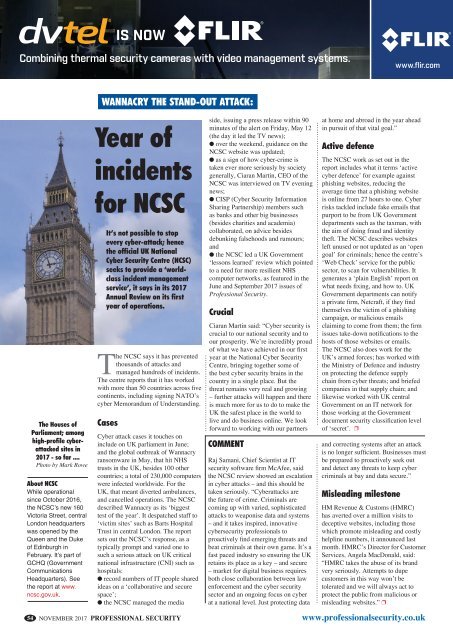27-11draft
You also want an ePaper? Increase the reach of your titles
YUMPU automatically turns print PDFs into web optimized ePapers that Google loves.
IS NOW<br />
Combining thermal security cameras with video management systems.<br />
www.flir.com<br />
Untitled-20 1 18/02/16 10:18<br />
wannacry the stand-out attack:<br />
The Houses of<br />
Parliament; among<br />
high-profile cyberattacked<br />
sites in<br />
2017 - so far ....<br />
Photo by Mark Rowe<br />
About NCSC<br />
While operational<br />
since October 2016,<br />
the NCSC’s new 160<br />
Victoria Street, central<br />
London headquarters<br />
was opened by the<br />
Queen and the Duke<br />
of Edinburgh in<br />
February. It’s part of<br />
GCHQ (Government<br />
Communications<br />
Headquarters). See<br />
the report at www.<br />
ncsc.gov.uk.<br />
Year of<br />
incidents<br />
for NCSC<br />
It’s not possible to stop<br />
every cyber-attack; hence<br />
the official UK National<br />
Cyber Security Centre (NCSC)<br />
seeks to provide a ‘worldclass<br />
incident management<br />
service’, it says in its 2017<br />
Annual Review on its first<br />
year of operations.<br />
The NCSC says it has prevented<br />
thousands of attacks and<br />
managed hundreds of incidents.<br />
The centre reports that it has worked<br />
with more than 50 countries across five<br />
continents, including signing NATO’s<br />
cyber Memorandum of Understanding.<br />
Cases<br />
Cyber attack cases it touches on<br />
include on UK parliament in June;<br />
and the global outbreak of Wannacry<br />
ransomware in May, that hit NHS<br />
trusts in the UK, besides 100 other<br />
countries; a total of 230,000 computers<br />
were infected worldwide. For the<br />
UK, that meant diverted ambulances,<br />
and cancelled operations. The NCSC<br />
described Wannacry as its ‘biggest<br />
test of the year’. It despatched staff to<br />
‘victim sites’ such as Barts Hospital<br />
Trust in central London. The report<br />
sets out the NCSC’s response, as a<br />
typically prompt and varied one to<br />
such a serious attack on UK critical<br />
national infrastructure (CNI) such as<br />
hospitals:<br />
l record numbers of IT people shared<br />
ideas on a ‘collaborative and secure<br />
space’;<br />
l the NCSC managed the media<br />
side, issuing a press release within 90<br />
minutes of the alert on Friday, May 12<br />
(the day it led the TV news);<br />
l over the weekend, guidance on the<br />
NCSC website was updated;<br />
l as a sign of how cyber-crime is<br />
taken ever more seriously by society<br />
generally, Ciaran Martin, CEO of the<br />
NCSC was interviewed on TV evening<br />
news;<br />
l CISP (Cyber Security Information<br />
Sharing Partnership) members such<br />
as banks and other big businesses<br />
(besides charities and academia)<br />
collaborated, on advice besides<br />
debunking falsehoods and rumours;<br />
and<br />
l the NCSC led a UK Government<br />
‘lessons learned’ review which pointed<br />
to a need for more resilient NHS<br />
computer networks, as featured in the<br />
June and September 2017 issues of<br />
Professional Security.<br />
Crucial<br />
Ciaran Martin said: “Cyber security is<br />
crucial to our national security and to<br />
our prosperity. We’re incredibly proud<br />
of what we have achieved in our first<br />
year at the National Cyber Security<br />
Centre, bringing together some of<br />
the best cyber security brains in the<br />
country in a single place. But the<br />
threat remains very real and growing<br />
– further attacks will happen and there<br />
is much more for us to do to make the<br />
UK the safest place in the world to<br />
live and do business online. We look<br />
forward to working with our partners<br />
Comment<br />
Raj Samani, Chief Scientist at IT<br />
security software firm McAfee, said<br />
the NCSC review showed an escalation<br />
in cyber attacks – and this should be<br />
taken seriously. “Cyberattacks are<br />
the future of crime. Criminals are<br />
coming up with varied, sophisticated<br />
attacks to weaponise data and systems<br />
– and it takes inspired, innovative<br />
cybersecurity professionals to<br />
proactively find emerging threats and<br />
beat criminals at their own game. It’s a<br />
fast paced industry so ensuring the UK<br />
retains its place as a key – and secure<br />
– market for digital business requires<br />
both close collaboration between law<br />
enforcement and the cyber security<br />
sector and an ongoing focus on cyber<br />
at a national level. Just protecting data<br />
at home and abroad in the year ahead<br />
in pursuit of that vital goal.”<br />
Active defence<br />
The NCSC work as set out in the<br />
report includes what it terms ‘active<br />
cyber defence’ for example against<br />
phishing websites, reducing the<br />
average time that a phishing website<br />
is online from <strong>27</strong> hours to one. Cyber<br />
risks tackled include fake emails that<br />
purport to be from UK Government<br />
departments such as the taxman, with<br />
the aim of doing fraud and identity<br />
theft. The NCSC describes websites<br />
left unused or not updated as an ‘open<br />
goal’ for criminals; hence the centre’s<br />
‘Web Check’ service for the public<br />
sector, to scan for vulnerabilities. It<br />
generates a ‘plain English’ report on<br />
what needs fixing, and how to. UK<br />
Government departments can notify<br />
a private firm, Netcraft, if they find<br />
themselves the victim of a phishing<br />
campaign, or malicious emails<br />
claiming to come from them; the firm<br />
issues take-down notifications to the<br />
hosts of those websites or emails.<br />
The NCSC also does work for the<br />
UK’s armed forces; has worked with<br />
the Ministry of Defence and industry<br />
on protecting the defence supply<br />
chain from cyber threats; and briefed<br />
companies in that supply chain; and<br />
likewise worked with UK central<br />
Government on an IT network for<br />
those working at the Government<br />
document security classification level<br />
of ‘secret’. p<br />
and correcting systems after an attack<br />
is no longer sufficient. Businesses must<br />
be prepared to proactively seek out<br />
and detect any threats to keep cyber<br />
criminals at bay and data secure.”<br />
Misleading milestone<br />
HM Revenue & Customs (HMRC)<br />
has averted over a million visits to<br />
deceptive websites, including those<br />
which promote misleading and costly<br />
helpline numbers, it announced last<br />
month. HMRC’s Director for Customer<br />
Services, Angela MacDonald, said:<br />
“HMRC takes the abuse of its brand<br />
very seriously. Attempts to dupe<br />
customers in this way won’t be<br />
tolerated and we will always act to<br />
protect the public from malicious or<br />
misleading websites.” p<br />
54<br />
NOVEMBER 2017 PROFESSIONAL SECURITY<br />
www.professionalsecurity.co.uk<br />
p54 Networks <strong>27</strong>-11.indd 1 10/10/2017 16:29










